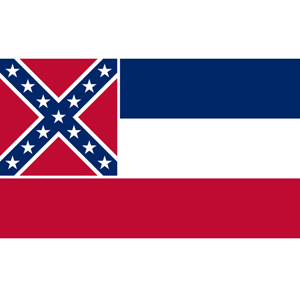Suit over Mississippi's confederate-themed flag uses language from SCOTUS same-sex marriage case

Mississippi state flag. Image from Shutterstock.
The Mississippi state flag, which includes a confederate symbol, amounts to hate speech against black people, a recent lawsuit (PDF) argues, and violates the Equal Protection Clause of the 14th Amendment of the U.S. Constitution.
Carlos Moore, the attorney who filed the case, told the Jackson Free Press that his action uses the same analysis from Obergefell v. Hodges, the 2015 U.S. Supreme Court case that legalized same-sex marriage.
“If [Obergefell v. Hodges] applies to same-sex couples, and they’ve got the right to be respected, surely African-Americans have the right to be respected too,” Moore told the paper.
The Mississippi flag was adopted in 1894, according to the Clarion Ledger. If Moore can prove that the state’s original intent was for the design was racist and discriminatory, he might have a good case, says Matt Steffey, a constitutional law professor at Mississippi College School of Law.
Steffey notes that free speech protections don’t apply to government speech, and mentions the 2015 U.S. Supreme Court case that found the state of Texas was not required to issue special license plates with the Confederate symbol. The case was brought by the Sons of Confederate Veterans.
In a statement to the Associated Press, Clay Chandler, director of communications for Mississippi Gov. Phil Bryant, described Moore’s lawsuit as “a frivolous attempt to use the federal court system to usurp the will of the people.”
Twelve bills to change the Mississippi flag were filed with the House Rules Committee, and in February all of them died, the Jackson Free Press reported at the time. Also during February, Bryant announced that April would be Confederate Heritage Month in Mississippi, WAPT reported at the time.
Moore told the paper that he waited to see what would happen with the bills before filing the lawsuit, and the Confederate Heritage Month proclamation was a significant motive.
His lawsuit mentions specific incidents of violence involving the Confederate flag, including a man who wrapped himself in one and bombed a Tupelo Wal-Mart after the store stopped selling Confederate merchandise. Also, Moore notes that Alabama took down its Confederate flag that flew at the Capitol after the mass shooting at South Carolina’s Emanuel African Methodist Episcopal Church at which nine black people were killed.
“All the other southern states have seen the light—Mississippi can’t seem to get it, but we’re trying to help them see and understand that that’s not acceptable,” Moore said. “No civil rights have been advanced in Mississippi without federal intervention, so we expect the federal government to protect us in this instance.”



